|
|
|
Sort Order |
|
|
|
Items / Page
|
|
|
|
|
|
|
| Srl | Item |
| 1 |
ID:
127907
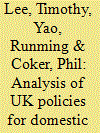

|
|
|
|
|
| Publication |
2014.
|
| Summary/Abstract |
This paper introduces a new agent-based model, which incorporates the actions of individual homeowners in a long-term domestic stock model, and details how it was applied in energy policy analysis. The results indicate that current policies are likely to fall significantly short of the 80% target and suggest that current subsidy levels need re-examining. In the model, current subsidy levels appear to offer too much support to some technologies, which in turn leads to the suppression of other technologies that have a greater energy saving potential. The model can be used by policy makers to develop further scenarios to find alternative, more effective, sets of policy measures. The model is currently limited to the owner-occupied stock in England, although it can be expanded, subject to the availability of data.
|
|
|
|
|
|
|
|
|
|
|
|
|
|
|
|
| 2 |
ID:
137798
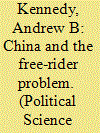

|
|
|
|
|
| Summary/Abstract |
IS CHINA PULLING ITS WEIGHT IN THE INTERNATIONAL SYSTEM? In recent years, China has increased its contribution to United Nations peacekeeping, raised its foreign aid to impoverished countries, and made significant commitments to global arms control initiatives.1 Even so, a rising chorus of voices has charged that China is “free riding” on cooperation undertaken by the United States and other countries that provides benefits to the wider international community. Calling China a free rider is nothing new; scholars described China as free riding on nuclear arms control agreements and international environmental cooperation as early as the 1990s.2 Yet with the United States beset by financial and economic woes in recent years, allegations that Beijing free rides on the United States and other countries have grown more frequent and more impatient. Whether the issue is fighting terrorism or preventing nuclear proliferation, it has become routine—particularly in the United States—to complain that China is not doing enough to support international cooperation.3 The number of articles containing both of the terms “China” and “free rider” in the Factiva database, for example, increased from an average of 39 per year from 2005 to 2009 to 75 per year from 2010 to 2013. Chinese observers, meanwhile, argue among themselves whether China free rides (da bian che) on the collective action of other states.4 Some agree that China should be seen as a free rider, at least in some areas.5 Other Chinese writers disagree and reject the notion that China should take on “even more responsibility” for global governance.
|
|
|
|
|
|
|
|
|
|
|
|
|
|
|
|
| 3 |
ID:
134050
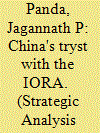

|
|
|
|
|
| Publication |
2014.
|
| Summary/Abstract |
Engaging with a multilateral body requires constructive foreign policy forethought, especially for a country that is not a fully fledged member of that body. China's overtures to the Indian Ocean Rim Association (IORA) exemplify this approach. The Indian Ocean and India are the two most immediate elements in China's policy approach to the IORA. With 20 member states, extra-territorial major powers as important dialogue partners, and the increasing importance of energy politics in the region, the IORA today is a significant multilateral body in China's calculus. Beijing's involvement with the IORA bespeaks the construct and strategy of a great power. For India, China's power construct in this matter poses three challenges: Beijing as a maritime power; Beijing as an economic power; and Beijing as a polygonal power.
|
|
|
|
|
|
|
|
|
|
|
|
|
|
|
|
| 4 |
ID:
127870


|
|
|
|
|
| Publication |
2014.
|
| Summary/Abstract |
In the last few years, rare earth materials (REM) prices have experienced a strong increase due to geopolitical and sustainability issues. Financial markets could already have factored in concerns about shortages of REM supplies into clean energy companies' valuations. We use a multifactor market model for the period January 2006 to September 2012 to analyze the impact of REM price trends - specifically dysprosium and neodymium - on six clean energy indices (NYSE-BNEF) tracking the world's most important companies in the clean energy sector. The results show that during period of price increase, there is a negative relationships between REM price changes and the stock market performance of some clean energy indices. The European clean energy index is also negatively affected, and this effect could be relevant to policy makers, considering that Europe is implementing some relevant policy actions to support the development of the clean energy industry.
|
|
|
|
|
|
|
|
|
|
|
|
|
|
|
|
| 5 |
ID:
174083
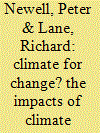

|
|
|
|
|
| Summary/Abstract |
The geophysical phenomena of climate change impact on the existing organization of energy economies and their attendant politics in multiple ways—at times magnifying and at other times dampening pressures on contemporary energy systems. Climate change has been increasingly viewed as a 'threat multiplier'. However, the geophysical phenomena of climate change are socially and politically mediated by actors with uneven power, capacity and divergent interests in order to support either incumbent or alternative energy pathways. While climate change intensifies and magnifies existing tensions and contradictions in global energy politics around the simultaneous pursuit of growth, security and sustainability, it does not do so in any straightforward or unmediated way. Instead, it gives rise to new concerns in relation to the imperatives of de-carbonization and increasing the resilience of energy systems. Understanding the impact of climate change on energy systems requires taking seriously the necessary role of energy within the global political economy and the relationship between fossil fuels and capitalism. It must be analysed both directly through climate change’s impacts, and indirectly through the uses of political narratives about climate change to sometimes unsettle, and sometimes reinforce, particular energy pathways.
|
|
|
|
|
|
|
|
|
|
|
|
|
|
|
|
| 6 |
ID:
127257


|
|
|
|
|
| Publication |
2014.
|
| Summary/Abstract |
Combined Heat and Power (CHP) has been proven as a mature technology that can benefit both building owners and utility operators. As the economic and environmental benefits of CHP in urban centers gain recognition, regulations and policies have evolved to encourage their deployment. However, the question remains whether these policies are sufficient in helping to achieve the larger sustainability goals, such as the New York City-specific goal of incorporating 800 MW of distributed generation. In this paper, the current regulatory and policy environment for CHP is discussed. Then, an engineering analysis estimating the potential for CHP in NYC at the individual building and microgrid scale, considered a city block, is performed. This analysis indicates that over 800 MW of individual building CHP systems would qualify for the current incentives but many systems would need to undergo more cumbersome air permitting processes reducing the viable capacity to 360 MW. In addition microgrid CHP systems with multiple owners could contribute to meeting the goal even after considering air permits; however, these systems may incorporate many residential customers. The regulatory framework for microgrids with multiple owners and especially residential customers is particularly uncertain therefore additional policies would be needed to facilitate their development.
|
|
|
|
|
|
|
|
|
|
|
|
|
|
|
|
| 7 |
ID:
133505
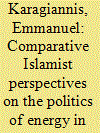

|
|
|
|
|
| Publication |
2014.
|
| Summary/Abstract |
The article will describe the general Islamic approach on energy based on the Sunnah of Prophet Muhammad, as well as the writings of prominent Muslim thinkers. Then it will examine and compare the energy perspectives of four Islamist groups: Hizballah, Hizb ut-Tahrir, the Muslim Brotherhood, and Al Qaeda. It will be argued that Islamist groups have attempted to achieve their external energy objectives by either using violence or exercising political blackmail against their opponents. Moreover, Islamists have developed globalized, glocalized, or localized "scale of engagement," depending on the targeted audience. Finally, the article will examine the security implications stemming from Islamists' interest in energy issues.
|
|
|
|
|
|
|
|
|
|
|
|
|
|
|
|
| 8 |
ID:
176122
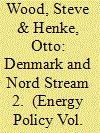

|
|
|
|
|
| Summary/Abstract |
This article analyses Denmark's involvement with the Nord Stream 2 gas pipeline project. Impressing the Baltic as a sea of strategic significance and a potential international flashpoint, the controversial project thrust Denmark into a position of decision-making importance beyond its size and material power. Geopolitical and environmental considerations, and normative impetus derived from a liberal democratic political culture, influenced Danish attitudes towards the project. The impact of these concerns substantially delayed the granting of a permit for pipeline construction in the Danish marine space, frustrating governments and business in Russia and Germany. Ultimately, approval was granted because Denmark is a rule of law state. Yet the delay is crucial. More broadly, the article illustrates how, in the energy policy domain, illiberal regimes attempt to exploit liberal-democratic legal systems through nominally commercial entities, and considers the responses by other actors in this case.
|
|
|
|
|
|
|
|
|
|
|
|
|
|
|
|
| 9 |
ID:
133275
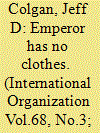

|
|
|
|
|
| Publication |
2014.
|
| Summary/Abstract |
Scholars have long debated the causal impact of international institutions such as the World Trade Organization or the International Monetary Fund. This study investigates Organization of Petroleum Exporting Countries (OPEC), an organization that purports to have significant influence over the market for the world's most important commodity-petroleum. Using four empirical tests, I find that OPEC has little or no impact on its members' production levels. These findings prompt the question of why so many people, including scholars, believe in OPEC's influence over the world's oil supply. The idea of OPEC as a cartel is a "rational myth" that supports the organization's true principal function, which is to generate political benefits for its members. One benefit it generates is international prestige. I test this idea using data on diplomatic representation and find that OPEC membership is associated with increased international recognition by other states. Overall, these findings help one to better understand international regimes and the process of ideational change in world politics.
|
|
|
|
|
|
|
|
|
|
|
|
|
|
|
|
| 10 |
ID:
127899
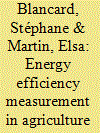

|
|
|
|
|
| Publication |
2014.
|
| Summary/Abstract |
Measuring energy efficiency is crucial when planning energy reduction policies. However, decision makers are understandably reluctant to act in the absence of solid data and results supporting a policy position. This paper proposes a methodology to measure the energy efficiency of farms based on the Data Envelopment Analysis (DEA) approach. In a manner similar to the cost framework, we decompose energy efficiency measurements into technical and allocative efficiencies in energy contents of inputs. In this study, we replace input prices used in traditional economic efficiency measurements by their energy content. We use the energy efficiency model to explore the optimal input-mix that produces the current outputs at minimum energy-consumption. We demonstrate that this decomposition can help policy makers design accurate energy policies. However, the uncertainty of the data and, more particularly, the energy content of the inputs leads us to recommend using the methodologies to calculate the bounds of efficiency to obtain more plausible and robust results. Based on our analysis, energy efficiency is not a fixed value, and policy-makers should consider it with caution. We use a 2007 database of French farms specialised in field crops for empirical illustration.
|
|
|
|
|
|
|
|
|
|
|
|
|
|
|
|
| 11 |
ID:
098966
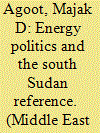

|
|
|
| 12 |
ID:
131365


|
|
|
|
|
| Publication |
2014.
|
| Summary/Abstract |
Despite criticism, global biofuel production continues to rise, using primarily food crops. Between 2001 and 2012 it increased nearly six-fold, driven primarily by domestic policies, yet raising strong international concerns, eg over impacts on global food prices. Nevertheless, little international biofuel governance has emerged. This article examines the various extraterritorial dimensions of domestic biofuel policies and investigates why international biofuel governance has remained vague, despite its controversial nature. It uses the politics of scale to analyse why countries may wish to frame it as a global or domestic issue. Three extraterritorial dimensions are identified: global environmental impacts, global socioeconomic impacts, and attempts at extraterritorial control over biofuel production abroad. While major producers have successfully avoided liability for impacts by preventing the scaling up of much biofuel governance to the international level, major importers have tried to fill perceived governance gaps using policies aimed at extraterritorial control. We show that both the rise of nationally oriented development policies with extraterritorial impacts and of unilateral sustainability rule making primarily affect weaker countries, making global inequalities more pronounced. It is essential that adaptation governance take into account both environmental and global socioeconomic changes, such as higher agricultural commodity prices.
|
|
|
|
|
|
|
|
|
|
|
|
|
|
|
|
| 13 |
ID:
134007


|
|
|
|
|
| Publication |
2014.
|
| Summary/Abstract |
International relations theories emphasize the stabilizing role hegemons play in world politics. But little scholarship has examined the link connecting hegemony to its potentially positive returns in the security realm: force posture. We correct this deficit by developing and testing an argument about the consequences of different hegemonic force postures under varying threat conditions. We present a typology of force posture options and probe their effects through over-time analysis of how major powers have worked to provide one particularly important public good since 1945: access to Persian Gulf oil. Drawing on field work, we also explore the implications of our framework for current and future US force posture in the region. We conclude that hegemonic stability is a very real phenomenon in the Gulf, but it does not require the massive forward deployment of US forces that has characterized the past twenty years of US presence there.
|
|
|
|
|
|
|
|
|
|
|
|
|
|
|
|
| 14 |
ID:
127884
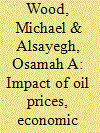

|
|
|
|
|
| Publication |
2014.
|
| Summary/Abstract |
This paper describes the influences of oil revenue and government's policies toward economic developments and energy efficiency on the electricity and water demands. A Kuwait-specific electricity and water demand model was developed based on historic data of oil income, gross domestic product (GDP), population and electric load and water demand over the past twelve years (1998-2010). Moreover, the model took into account the future mega projects, annual new connected loads and expected application of energy conservation programs. It was run under six circumstances representing the combinations of three oil income scenarios and two government action policies toward economic diversification and energy conservation. The first government policy is the status quo with respect to economic diversification and applying energy conservation programs. The second policy scenario is the proactive strategy of raising the production of the non-oil sector revenue and enforcing legislations toward energy demand side management and conservation. In the upcoming 20 years, the average rates of change of the electric load and water demand increase are 0.13 GW and 3.0 MIGD, respectively, per US dollar oil price increase. Moreover, through proactive policy, the rates of average load and water demand decrease are 0.13 GW and 2.9 MIGD per year, respectively.
|
|
|
|
|
|
|
|
|
|
|
|
|
|
|
|
| 15 |
ID:
127896
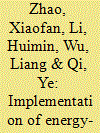

|
|
|
|
|
| Publication |
2014.
|
| Summary/Abstract |
Local governments have replaced the national ministries that are in charge of various industries to become the primary implementer of energy-saving policies in China since 2000. This paper employs a case study-based approach to demonstrate the significance of local governments' policy measures in assisting industrial enterprises with energy-saving activities in China. Based on the longitudinal case of the Jasmine Thermal Electric Power Company, this paper hypothesizes that sub-national governments have played a major role in implementing energy-saving policies in China since the 11th Five-year-plan period. A wide range of provincial and municipal agencies collaborated in implementing five types of policy measures - informational policy, skill building, improved enforcement of central directives, price adjustment, and funding - that reduced barriers to energy saving and motivated active pursuit of energy-saving activities at industrial enterprises. The case study demonstrates how an enterprise and local governments work together to achieve the enterprise's energy-saving target. The authors will investigate the hypothesis of this paper in the context of multiple case studies that they plan to undertake in the future.
|
|
|
|
|
|
|
|
|
|
|
|
|
|
|
|
| 16 |
ID:
171527
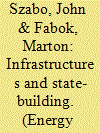

|
|
|
|
|
| Summary/Abstract |
Energy is the lifeblood of a state's economy, which leads energy infrastructures to form intricate relations with state-building. We assess how state-building and energy infrastructures are intertwined and shape one-another. To explore this nexus, we have developed a novel framework that traces the ideology, the political economy, and the technopolitics in this relation. Through case studies focusing on the actions of the European Commission alongside those of the self-proclaimed illiberal governments of Hungary and Poland, we convey the variegated approaches embodied in the state-building – energy infrastructure relation. The Commission has sought to further an integrationist agenda predicated on its bid to create a single EU energy market. This stands in contrast to the paternalism embodied in the approach of the Hungarian and Polish governments to energy infrastructures. These emphasise nationalisation, state-control of key energy sector actors and infrastructures, as well as control over consumer prices. Hungary has also sought to position itself as a regional energy hub, while Poland has looked to maintain energy self-sufficiency, while struggling to meet EU climate goals. We find that the approaches of self-proclaimed illiberal EU countries frequently clash with the Commission's visions. However, in many cases they are reconcilable, although on fundamentally different ideological, political economic, and technopolitical grounds.
|
|
|
|
|
|
|
|
|
|
|
|
|
|
|
|
| 17 |
ID:
112522
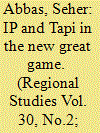

|
|
|
| 18 |
ID:
133774


|
|
|
|
|
| Publication |
2014.
|
| Summary/Abstract |
U.S. politicians often work the topic of oil import independence into their campaign rhetoric as an ideal that would help separate U.S. economic prosperity and military responsibility from the volatility of Middle Eastern politics. In theory, oil independence would mean that events such as the Iranian revolution or internal political unrest in key Arab oil producers would have much less direct impact on the flow of oil to the United States, and thus U.S. prosperity (even if, in a global market for oil, the price impact of any supply disruption is shared by all consuming countries). More importantly, intra-state conflicts such as the Iraq-Iran war or the Iraqi invasion of Kuwait would not necessarily require large-scale U.S. military involvement to ensure oil production and exports to the United States and its allies. This linkage between U.S. oil import dependence and military commitment to the Gulf region has given rise to a myth favored by policymakers, markets, and the public that if the United States could attain oil independence, we could also reduce our military responsibilities around the world. Recent and ongoing changes in both the oil sector and in political-military strategy are for the first time in forty years combining in a manner that is leading some to believe this story could come true.
|
|
|
|
|
|
|
|
|
|
|
|
|
|
|
|
| 19 |
ID:
134051
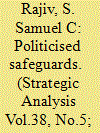

|
|
|
|
|
| Publication |
2014.
|
| Summary/Abstract |
This article examines Iranian contentions on three issue areas that exemplify the politicised nature of its interactions with the International Atomic Energy Agency (IAEA). These include access to military facilities, information credibility and the 'nuclear activism' of US-based non-governmental organisations (NGOs). Three drivers account for the emergence of such contentions: (1) multilateral and unilateral sanctions; (2) extended lack of progress at multilateral negotiating forums like the P5+1 and the E3/EU; and (3) organisational dynamics primarily related to the deterioration in Iran's interactions with the IAEA in the aftermath of the election of Yukiya Amano as the IAEA Director General (DG). Changes in dynamics in one or more of these factors, on the back of changes in domestic political leaderships (primarily in the US and Iran) and consequent modifications in their respective policy positions, have led to mutually agreeable outcomes like the November 2013 Joint Plan of Action (JPOA). In the context of 'politicised safeguards' losing some of their edge in the aftermath of the JPOA, the article closes by briefly examining the prospects of the IAEA drawing a 'broader [safeguards] conclusion' for Iran amidst the significant challenges that still need to be addressed.
|
|
|
|
|
|
|
|
|
|
|
|
|
|
|
|
| 20 |
ID:
121304
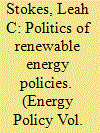

|
|
|
|
|
| Publication |
2013.
|
| Summary/Abstract |
Designing and implementing a renewable energy policy involves political decisions and actors. Yet most research on renewable energy policies comparatively evaluates instruments from an economic or technical perspective. This paper presents a case study of Ontario's feed-in tariff policies between 1997 and 2012 to analyze how the political process affects renewable energy policy design and implementation. Ontario's policy, although initially successful, has met with increasing resistance over time. The case reveals key political tensions that arise during implementation. First, high-level support for a policy does not necessarily translate into widespread public support, particularly for local deployment. Second, the government often struggles under asymmetric information during price setting, which may weaken the policy's legitimacy with the public due to higher costs. Third, there is an unacknowledged tension that governments must navigate between policy stability, to spur investment, and adaptive policymaking, to improve policy design. Fourth, when multiple jurisdictions pursue the same policies simultaneously, international political conflict over jobs and innovation may occur. These implementation tensions result from political choices during policy design and present underappreciated challenges to transforming the electricity system. Governments need to critically recognize the political dimension of renewable energy policies to secure sustained political support.
|
|
|
|
|
|
|
|
|
|
|
|
|
|
|
|
|
|
|
|
|